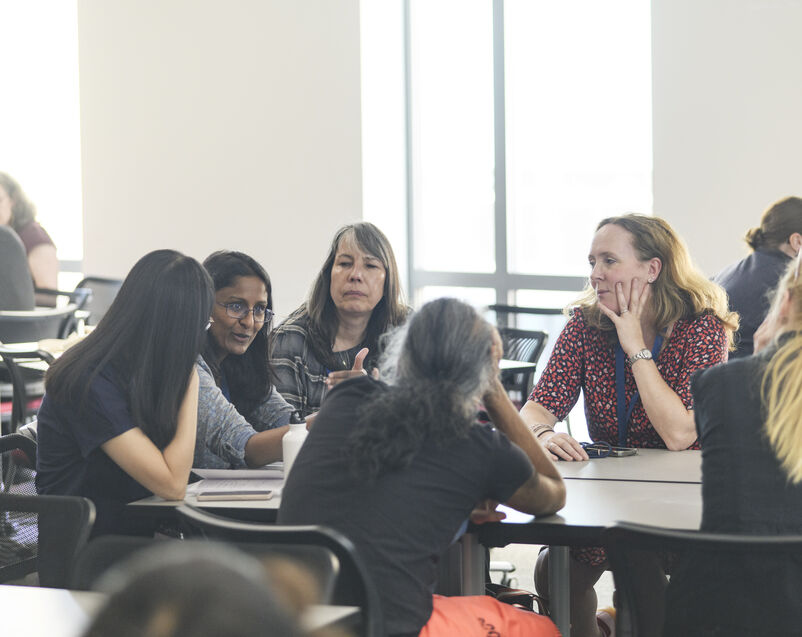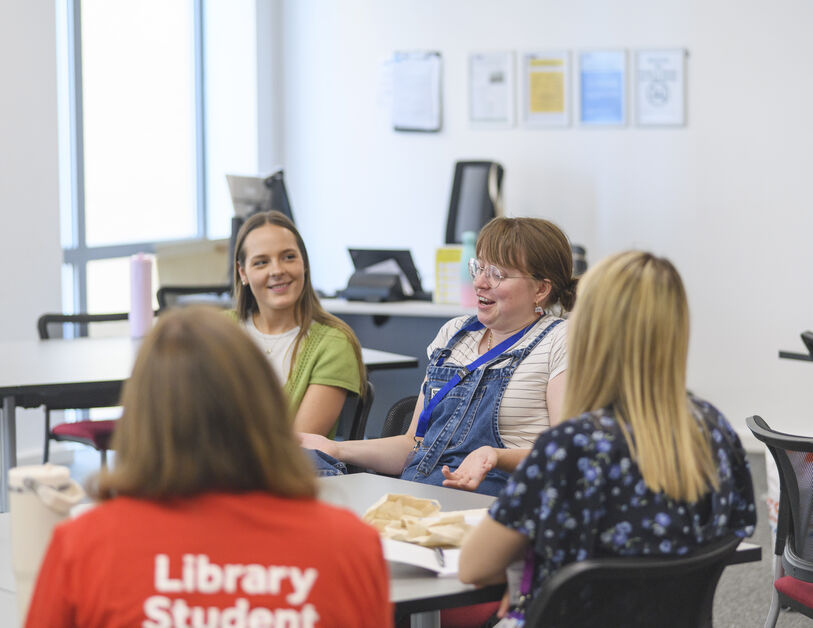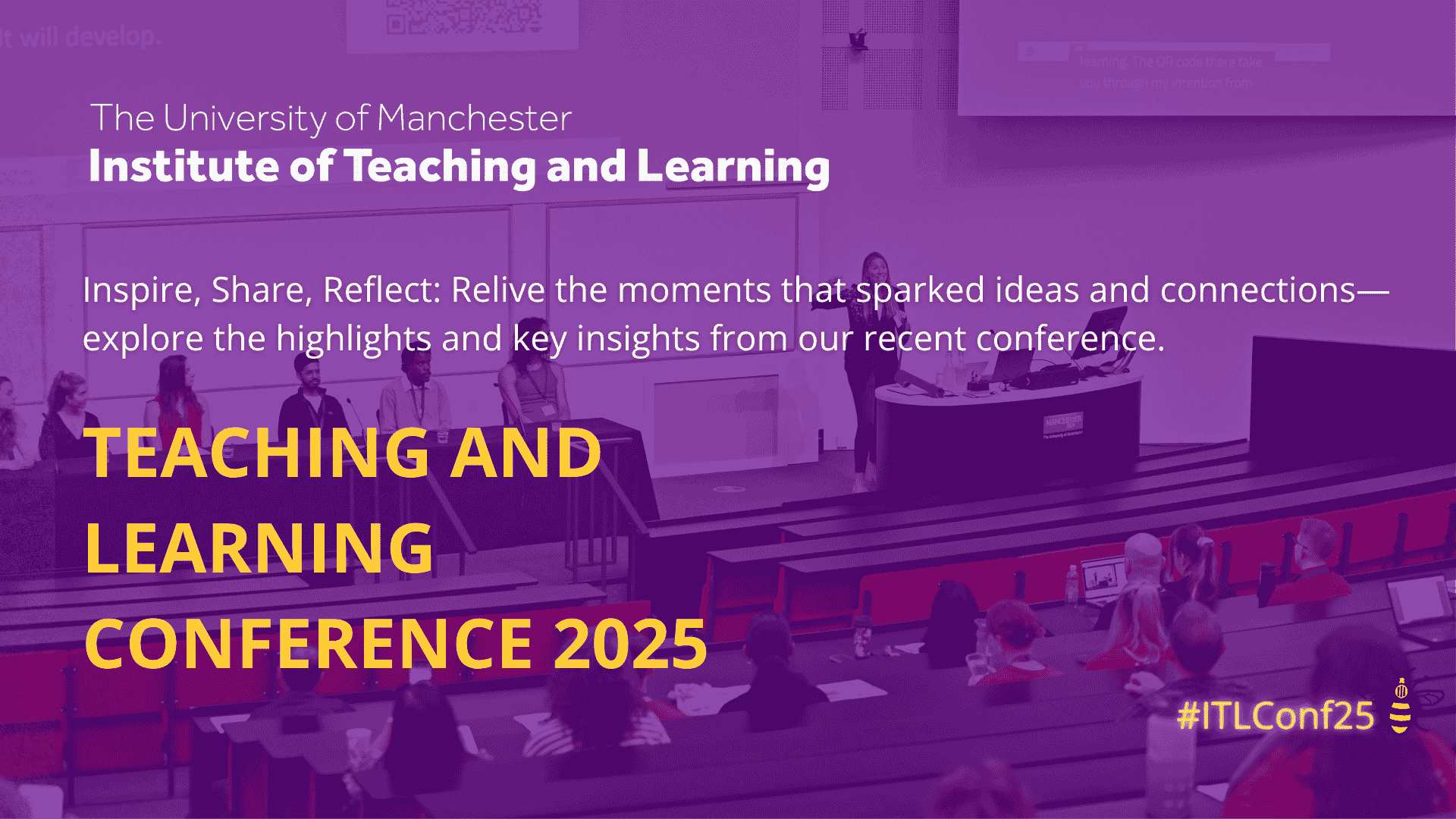
ITL Conference 2025
The 2025 Institute of Teaching and Learning Conference at the University of Manchester was a dynamic and impactful two-day event that bought together students and to explore key developments in teaching and learning. The conference centred around the three core themes of inclusive education, building belonging and raising student voices, and redefining learning and teaching in higher education which fostered rich dialogue and highlighted innovative practices. Attendees cultivated a lively environment of collaboration and idea exchange through active engagement in wicked problem sets, paper presentations, poster presentations and lightning talks. The conference left attendees feeling inspired and empowered to implement meaningful improvements in teaching and learning across the University and within the wider higher education landscape.
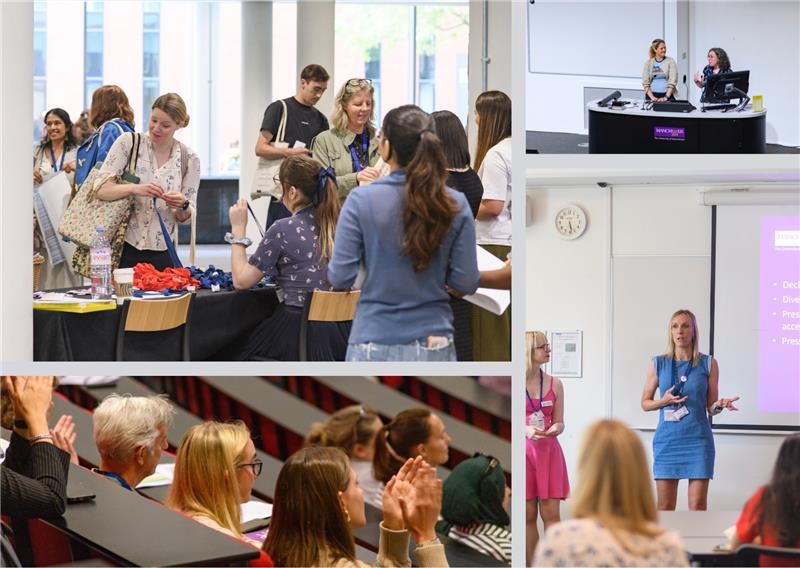

Wednesday - Plenary Session 1: Strategy, Teaching and Learning
The first plenary session of the conference explored teaching and learning as a central strategic priority for the University of Manchester. Led by President and Vice-Chancellor Professor Duncan Ivison, alongside Professor Adam Danquah (Faculty of Biology, Medicine and Health) and Humanities student Szaff Jarbath, the session introduced the University’s forthcoming strategy, set to launch in the new term.
The discussion centred on placing students at the heart of institutional decision-making by embedding student voice at every level. Key themes included the evolving relationship between students and technology, the importance of employability beyond graduation, and the need for a holistic and inclusive approach to supporting both staff and students. The panel also addressed the importance of visibility - ensuring student concerns are clearly acknowledged and acted upon - highlighting the University’s commitment to transparency and meaningful engagement.
Thursday - Plenary Session 2: Beyond satisfaction surveys: What university teaching really means to students?
This thought-provoking plenary, led by Professor Steve Jones (Professor of Higher Education, Institute of Education), challenged attendees to look beyond traditional satisfaction surveys and performance metrics to gain a deeper understanding of what university teaching truly means. Central to the session was a dynamic student panel featuring Fariha Agha, Rachel Cynthia, Valavan Vetrigo, and Olivia Shaw, whose lived experiences brought the discussion to life.
Professor Jones presented five key arguments, including the notion that those who deliver teaching and learning may not fully grasp the student experience—and that mis-conceptualising teaching can lead to mismanaging it. The conversation highlighted the importance of reimagining higher education with students as co-creators, not just recipients. Students shared how their most impactful learning occurred when academic staff offered personalised, responsive support, reinforcing the value of authentic partnership in the learning process.
Thursday - Plenary Session 3: Supporting a-typical pathways?
This compelling plenary session explored how universities can better support and empower students who follow non-traditional or "atypical" pathways into and through higher education. Led by Dr Perpetual Idehen (University of Manchester alumna and postdoctoral researcher in sustainability and chemical engineering) and Emma Lewis-Kalubowila (Access and Success team), the session highlighted the importance of recognising diverse experiences and enriching student journeys beyond conventional routes.
A diverse student panel, including Dominik Kaleta, Carl Kulimushi, Victor Sanchez, Naz, Zanib Patel, Marty Maquillan-Graham, Lilian Chidi-Onuorah, and Savanna, shared honest reflections on their challenges and growth. Panellists spoke about experiences such as transitioning between courses, taking gap years, coming from underrepresented schools, or being care-experienced or estranged. A shared theme across stories was the transformative power of support systems that focus not on past circumstances, but on students' potential moving forward. The session offered practical insights into how staff can actively listen, respond, and create inclusive environments that allow all students to thrive—regardless of how they arrived at university.
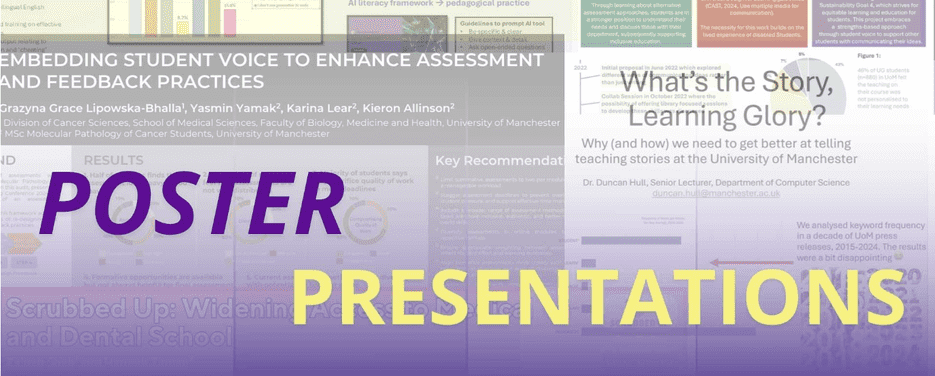
The conference featured a series of engaging poster presentations that explored a range of innovative approaches to teaching and learning. Highlights included using student voice to advocate for interdisciplinary AI literacy, rethinking assessment and feedback practices, widening access to medical and dental education, and culturally responsive cooperative learning for English as a foreign language students. Together, these presentations offered fresh perspectives and practical strategies that enriched the conference’s collaborative atmosphere and inspired ongoing reflection and action.
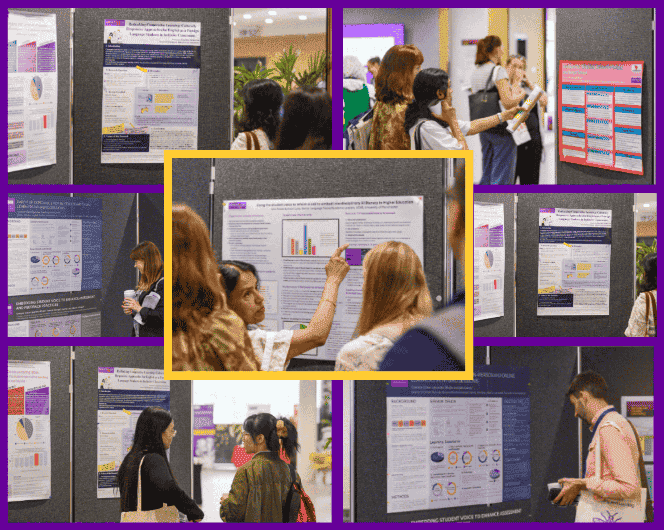
Click here to access the poster presentations.

Standard Papers
The conference featured paper presentations on three key themes: inclusive education, building belonging and raising student voices and redefining learning and teaching in higher education. From these themes emerged engaging sessions covering a broad spectrum of topics including widening access to data-science teaching, embedding diversity within the curriculum, integrating applied practice into classroom settings and exploring the impact of interdisciplinary learning. The presentations sparked rich discussions among participants, inspiring reflection and innovation in teaching and learning approaches across higher education.
Day 1
Paper Presentations : Belonging and Inclusion
Learning to Learn: Building Belonging from the Beginning
Catherine Porter, Will Holmes, Catherine Collin & Andy Gridley
Co-developing a 2nd Year BSc Psychology Unit on Autism
Amber Ruigrok, Stefan Perryman, Lorna Brown, Jowan Khalid and Emma Gowen
LGBT+ Affirmation in the Undergraduate Medical Curriculum
Dr Luke Wookey & Professor Ruth Bromley
Paper Presentations: Raising Student Voices
Redefining Peer Review of Teaching: Partnering with Students for Meaningful Feedback
Emma Hollenberg & Mario Pezzino
Redefining Student Voice Meetings
Students' Union Education Team
Paper Presentations: Innovate and Authentic Assessment
Developing oral skills and critical thinking through problem-orientated group work and assessment
Dr Louisa Dawes & Dr Craig Thomas
Bringing applied practice into the classroom through authentic assessments in Forensic Psychology
Polly Turner, Verity Wainwright and Zaynab Khan
Advancing digital exams: evaluating a BYOD digital assessment pilot
Maria Canal, Ben Chapman and Lisa Swanton
Paper Presentations: Inclusion in Digital and Online Teaching
Reflections on 20 years of online teaching
Catherine Stanton
Paper Presentations: Raising and hearing student voices
Recognising and Listening to the Student Voice in Service-Learning
School Reps – What’s It All About?
Building Belonging and Raising Student Voices: Insights from the ABC Toolkit Fellowship.
Rachel Studd, Rachel Parker-Strak, Thomas Pierce-Jones
Fostering Belonging and Student Voice through Graduate Teaching Assistant (GTA) Development.
Stephie Tsai, Aurelie Le Normand, Elisabeth Allen, Zeeshan Azam, Clare Richardson, Darya Badiei Khorsand, Md Abdullah Mamun, Xiaoqing Zhang
Paper Presentations: Interdisciplinary Learning
Expanding the Reach and Impact of Interdisciplinary Learning at Manchester
Alison Fisher
Why interdisciplinary degrees will produce the graduates of the future.
Dr Donna Lloyd, Dr Ruth Ingram & Dr Ellen Poliakoff
Supporting undergraduate interdisciplinary engagement and meta-Cognition.
Dr Maria Kopsacheili
Paper Presentations: Social justice and challenging Western normativity
Teaching About Inequality: The Psychological Impact on Students.
Dr Doron Cohen & Dr Stacey McKnight
A systemic approach to inclusive education: the Learning for Every Body project.
Christopher Sutton & Dawn Clark
Challenging the West as the standard: Students’ views on the representation of cultural understandings of mental health in the psychology curriculum
Wahida Walibhai & Louisa Shirley
Paper Presentations: Building belonging through relational pedagogies, co-creation and group work
Creating open and collaborative learning spaces for staff-student co-creation.
Dave Hirst and Rachel Cox
Developing Employability Skills through Interdisciplinary Group Work
Sofia Izquierdo Sanchez and Sara Jabeen
Paper Presentations: Enhancing and Innovating in Assessment
Write or wrong? Rethinking essays: a comparative study of very short answer vs multiple choice questions
Dr Harry Potter
Enhancing Assessment Review: A model for review and revolution
Jen McBride, Sally Hickson & Nicky High
Using Cadmus to Scaffold Higher Education Assessments
Dr Hannah Wilkinson

Day 2
Paper Presentations: Foundation and Transition
Inclusive Education for International Students – From a student's perspective
Dr. Lei Zeng
Foundation Years in SBS: Providing a fair shot’ (or not) for students
Dr. Sarah Hatherill & Mrs. Suzanne Thatcher
Starting Conversations Co-creating resources to support the transition to university
Doron Cohen, Louis Flintham, Amelia Hickman,Karen Lander, Donna Lloyd, Elizabeth McManus-Day, Ellen Poliakoff, Annie Pye, Debbie Smith,Ming Wai Wan
Paper Presentations: Assessment, Feedback and AI
Raising student voices via peer-to-peer feedback
Rachel Heasley & Chuning Xu and Shiyu Zeng
Bridging Teaching and Assessment: developing assessment literacy for all through co-produced Rubric design development
Dr Louisa Dawes, Ruohan Luo, Yaoyao Shi, Dr Fiona Velez-Colby
Paper Presentations: Climate crisis, Environmental sustainability and SDGs
Student experiences of completing a final-year project on the climate-crisis
Rebecca Champion and Rachel Ashworth
Environmental sustainability projects: a welcome addition to our portfolio of final year (‘capstone’) projects
Dr. Maggy Fostier and Dr. Ruth Grady
Paper Presentations: Active Learning and innovative assessment for inclusion
FSE Peer Action Learning (PAL): Inclusive Teaching Practice
Alison Harvey, Aurelie Le Normand, Elika Aminian, Louise Walker, Martin Simmons, Simon Raw
Play to your strengths: The unessay as inclusive, flexible assessment and learning as a process
Dr F. A. Eissa-Barroso
Lessons Learned From Gamification of T&L to Enhance Students’ Engagement
Elika Aminian, Jillian Yeow, and Ian Stewart
Paper Presentations: Academic Advising, collaborative working and enhancing independent learning
Enhancing independent language learning through a collaborative resource
Sandra Torres
Student Experiences of Academic Advising on a Large-Cohort Undergraduate Programme
Jess Leather, Shubhi Kohli & Becky Champion
Paper Presentations: Digital Competencies, blended learning and AI
Enhancing employability and Digital Competencies: Developing E-portfolios in Social Sciences
Tatjana Kecojevic
Getting the Blend Right in Blended Learning: Lessons Learned from a Postgraduate Taught Programme
Grazyna Grace Lipowska-Bhalla
Exploring Generative AI in Initial Teacher Education
Karen Kilkenny, David James, Natalie Jayson, Liz Birchinall, Andrew Rhodes
Paper Presentations: Feedback and Experiential Learning for Inclusion
A win-win: Developing Student Assessment Feedback Literacy whilst lessening marker workload
Karen Beswick, Tanya Chandi & Nghi Lam
Breaking Barriers Reflections on an Inclusive Clinical Lecturing Internship in Speech and Language Therapy: One Year on
Hawra’a Abid, Jack Delaney, Stephanie Greenwood-Davies & Alexandra Sturrock
Pedagogies of power: experiential groupwork as a mechanism for promoting equality in social work education
Pat Cartney and Dharman Jeyasingham
Paper Presentations: Social Networks and Digital Tools
Using Video Assessment within curriculum
Emma Brewin-Caddy and Sophie Coller & Belen Lopez-Perez
Using Nearpod to enhance Student Engagement and Formative Assessment in PGT Teaching
Helen Jopling and Phil Macdonald
The use of social networks to improve engagement and implement a research-led curriculum
Dr. Sofia Izquierdo Sanchez & Dr. William J. Tayler
Paper Presentations: Team-Based Learning
Enhancing Practical Learning in Postgraduate Education: Integrating Digital Tools and Team-Based Learning in MSc Medical Microbiology
Dr Hannah Serrage, Dr Stavros Panagiotou, Dr Jenny Herbert and Dr Moustafa Alissa Alkhalaf
Ensuring Student Success in Medical TBL: The Power of Performance Analytics
Lisa Donlan, Elizabeth Sheader & Michael Smith
Enhancing Inclusion and Engagement Through Flexible Team-Based Learning (TBL)
Claire Burns, Lisa Donlan, Maryam Al-jeddal

Wicked Problem Sets
This year’s Wicked Problem Set sessions challenged participants to engage with complex, real-world issues currently affecting higher education today. The sessions focused on topics such as inclusive assessment, digital literacy, and sustainable curriculum design, the sessions invited collaborative problem-solving and critical reflection. These discussions provided a space for diverse perspectives and creative thinking among participants, reinforcing the conference’s commitment to addressing systemic challenges through partnership and innovation.
Click on the tiles to access the session materials.
Starting Conversations: Creatively supporting the transition to university
Doron Cohen, Louis Flintham, Karen Lander, Donna Lloyd, Elizabeth McManus-Day, Ellen Poliakoff, Annie Pye, Debbie Smith & Ming Wai Wan
Amplifying Student Voices to Transform Medical Education: Advocating for Planetary Health
Yasmin Tyrrell, Simonne Weeks, Nia Coupe, Noelle Caruso-Kelly, Hau Ying Yan, Harshini Suresh
How can digital wellbeing be embedded within the Teaching, Learning and Student Experience?
Digital Capability Student Reps, Gabba Sutcliffe de Oliveira, Emma Bramwell, Kai Prince, Carlene Barton, Yamin Mushtaq & Jane Mooney
How can digital capability be effectively embedded within the curriculum?
Francesca Demontis, Emilie Greathead, Alice Godliman, Emma Bramwell, Digital Capability Student Reps, Caroline Bowsher and Jane Mooney
Redefining employability development- challenging the status quo through entrepreneurship
Jennifer Rose, Shirley Jenner, Javed Siddiqui, Adam Frost, Alex Wong
From Users to Co-Creators: Shaping Responsible AI use in Student Learning
Wennie Subramonian, Maryam Malekshahian, Ahnaf Saumik
Starting with empathy: using human-centred design tools to improve our students' experiences
Sarah Dyer and Chiachi Ming
What could Service/ Community Engaged Learning look like in my programme?
Rachel Lindley, Julian Skyrme, Lynne Bianchi and Phil Drake
Academic Advisors- how can we enhance student belonging?
Helen Jopling and Krystyna Drewenska
Can Higher Education truly be Decolonised
Sohini Biswas and Becca Annoh
Communicating in the international classroom
Ruth Fordham

Where fresh thinking meets fast delivery—insights on learning, inclusion, and student voice
Themes this year:
- Equality, Diversity and Inclusion in Teaching and Learning - Watch Lightning Talk Session 1 here
- Inclusive teaching innovation - Watch Lightning Talk Session 2 here
- Assessment & Feedback, Collaboration to Empower Students - Watch Lightning Talk Session 3 here
- Sustainable Development, Inclusive and Reflective practice - Watch Lightning Talk Session 4 here
- Peer Learning to build belonging and SU Initiatives Raising Student Voice - Watch Lightning Talk Session 5 here
Lightning Talks
The Lightning Talks sessions featured fast-paced, engaging presentations from staff and students, each offering concise insights into current challenges and innovations in teaching and learning. Talks were organised across five thematic sessions: Equality, Diversity and Inclusion in Teaching and Learning; Inclusive Teaching Innovation; Assessment and Feedback, Collaboration to Empower Students; Sustainable Development, Inclusive and Reflective Practice; and Peer Learning to Build Belonging and SU Initiatives Raising Student Voice.
Topics ranged from embedding AI and neuro-inclusive writing practices, to student-staff co-creation, and developing supportive networks. The format encouraged impactful storytelling and was followed by interactive Q&A discussions that inspired idea-sharing, cross-disciplinary dialogue, and practical takeaways. These sessions highlighted the University's ongoing commitment to inclusive, forward-thinking education and the importance of partnership in shaping meaningful change.
